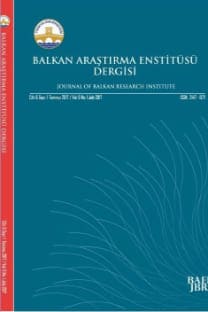Balkanlar’da Sembolik Mücadele Alanı Olarak Kutsal Mekânlar– Bulgaristan Örneği
Aynı coğrafyayı paylaşan farklı dini ve etnik grupların zaman içinde bazı ortak değerler
edinmesi, sıkça rastlanan bir olgu olmakla birlikte, bu değerlerin modern dünyada farklı kullanım
biçimleri söz konusudur. Bugün Balkanların zengin bir kültürel çeşitlilik arz eden yapısı içinde
“bellek mekânı” olarak adlandırılan kutsal mekânlar üzerine eğilmek, bölgenin sadece kültürel
değil, aynı zamanda siyasi, dini, ekonomik ve toplumsal dünyasına da açılan geniş bir perspektif
sunmaktadır.
Balkanlarda kültürel çeşitliliğin sembolü haline gelmiş olan kutsal mekânları konu alan bu
çalışmanın temel çıkış noktası, Bulgaristan örneği üzerinden, bölgedeki farklı dini-etnik grupların
ortak kültürel mirası haline gelen değerleri, günümüz iktidar ilişkileri bakımından yeniden ele alıp
sorgulamaktır. Buradaki amaç, konuyu hem tarihi hem de güncel boyutuyla irdeleyerek bütüncül
bir bakış açısı oluşturmak ve kutsalın, gerek kültürel kimliğin gerekse iktidar ilişkilerinin
biçimlenişi ve devamı açısından oynadığı rolü ortaya koymaktır. Bu amaca uygun olarak da,
tarihsel yaklaşımın yanı sıra, halk bilimi, kültürel antropoloji ve sosyoloji gibi bilim dallarının
yöntem ve verilerinden yararlanma yoluna gidilmiştir.
Anahtar Kelimeler:
Balkanlar, Bulgaristan, Kutsal Mekânlar, Kültürel Kimlik, İktidar
SACRED PLACES IN BALKANS AS SYMBOLIC ARENA – EXAMPLE OF BULGARIA
Different religious and ethnic groups to acquire some common values in the same region
over time are a phenomenon frequently observed, although there are different usage patterns of
these values in the modern world. Today, the structure of the Balkans, which are rich in cultural
diversity "memory space referred to as" lean over the holy places of the region, offers a broad
perspective not only cultural but also political, religious, economic and to the social world.
This study’s subject of holy places, which has become a symbol of cultural diversity in the
Balkans, is the starting point for the case of Bulgaria, the different religious-ethnic groups cultural
heritage which has become the common values in the region are re-contextualizes and questioning
today in terms of power relations. The purpose of this topic by examining the size of both historic
and contemporary to create a holistic perspective, and to reveal the role of sacred, both in terms of
cultural identity and the subsequent formation of power relations. For this purpose, the historical
approach, as well as folklore, cultural anthropology, and sociology disciplines were encouraged to
benefit from the methods and data.
Keywords:
Balkans, Bulgaria, Sacred Spaces, Cultural Identity, Power,
- ISSN: 2147-1371
- Yayın Aralığı: Yılda 2 Sayı
- Başlangıç: 2012
- Yayıncı: Trakya Üniversitesi
Sayıdaki Diğer Makaleler
1912-1913 Balkan Savaşları’nın Edebiyata Yansıması
SELANİK SORUNU VE BALKAN SAVAŞLARI
Bulgaristan’ın Osmanlı İmparatorluğu’ndan Ayırılış Sürecinde Bulgar Ayaklanmaları
MİLLİYETÇİLİK DÖNEMİNDE ARNAVUT MİLLİYETÇİLİĞİNİN YETERSİZLİĞİ VE BAŞARILARI
Balkanlar’da Sembolik Mücadele Alanı Olarak Kutsal Mekânlar– Bulgaristan Örneği
